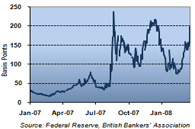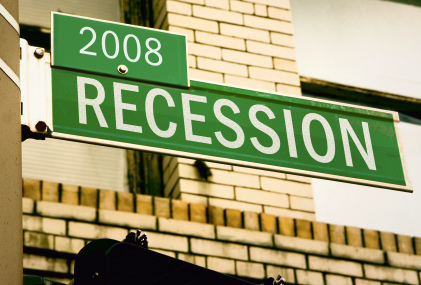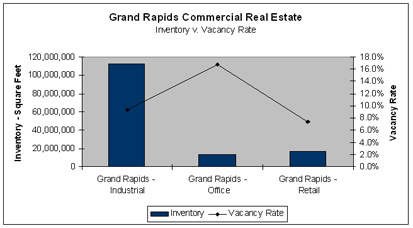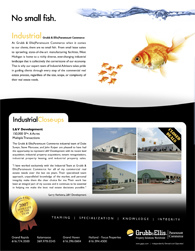|
OFFICE
Many
suburban office users are seeking to take advantage of the relatively
soft general office market and historically low interest rates and are
purchasing as opposed to leasing. However, the amount of quality
suburban office product available for sale is relatively low…especially
for smaller stand-alone office buildings. Owners of office buildings
with vacancies may want to consider listing their properties for sale
to take advantage of this swell in demand.

|
INVESTMENT
Investment
real estate has been highlighted by increased levels of out-of-state
dollars flowing into West Michigan. The Grubb &
Ellis|Paramount Commerce team completed over $135 Million in sales in
2007, 80% of which was sold to out of state buyers. Activity
remains steady, however, instability of the debt markets has begun to
temper investor demand and has led to some price decreases.
Lenders and financial institutions are becoming increasingly more
cautious on many real estate transactions. The primary issue
impacting the marketplace in 2008 will be buyers ability to find
adequate financing.

|
RETAIL
2008
will provide some new challenges and opportunities. While the
newest retail sectors will continue to fill-in, the corridors with a
glut of 2nd and 3rd generation spaces will find it harder to lure
incoming tenants to their centers. New construction will continue
but at a very modest rate with a strong percentage of the building
being leased prior to breaking ground. Retail investment activity
within the West Michigan area will continue with investors being more
particular in their purchases.

|
INDUSTRIAL
Last
year, the West Michigan market continued to defy conventional wisdom by
showing a net gain in occupancy of almost 1.3 million square
feet. While we have seen and will likely continue to see some
local businesses shut down, particularly the smaller automotive
suppliers, we anticipate that 2008 will also show a net gain in
industrial space being filled. 2007 was a banner year for
industrial investment sales. While it will be very difficult to
replicate the dollar volume of last year's transactions, there are
still many buyers and sellers in the market looking for
opportunities. While the international credits markets are not as
liquid as in the past, local bank financing is at historically low
interest rates, creating opportunities for continued market
velocity. We anticipate that local industrial market will
continue moving forward in a positive direction as it has in recent
memory, despite all of the negative factors that exist in the global
marketplace.

|
PROPERTY MANAGEMENT
BOMA
Opposes Utility Plan Restructuring: The Building Owners and Managers
Association (BOMA) is strongly opposed to the proposed restructuring of
the electric energy legislation. The
restructuring is being positioned as a route to cleaner energy by
promoting increased renewable sources and this is a very worthy goal,
however under the proposed plan the cost of these sweeping changes will
be born largely by utility customers. Since PA 141 of 2000 – the
electrical deregulation act, Michigan has been very successful in
maintaining lower utility rates for it’s customers; under the proposed
restructuring, a 30-40% utility rate increase is predicted. Commercial
real estate owners are already bearing an additional burden because of
increased vacancies in their portfolios, an increase in utility rates
will only add insult to injury for real estate owners and do nothing to
attract new business and create jobs in our state.

|
TED SPREAD
Written By: Robert Bach
Senior Vice President
Grubb & Ellis Company
One
measure of the credit squeeze is the TED spread -- the difference
between interest rates on 3-month Treasury bills (“T”) and the 3-month
Eurodollar futures contract (“ED”) as represented by the dollar London
interbank offered rate (Libor). Treasuries are risk-free, while Libor
is a proxy for the credit risk of corporate borrowers. The recent
spikes coincide with heightened stress in the capital markets and
greater investor caution. Tighter credit is affecting all corners of
the economy including commercial real estate, which is seeing slower
leasing and investment activity.

|
|
 |

|
|
Is Chicken Little Right?
By: Bill Bussey, CCIM
Everyday
we see articles in the newspaper and reports on TV as to how bad the
economy is and how things can only get worse. We're all familiar
with Chicken Little's famous line, but do you think he was really
foretelling West Michigan's future when he said, "the sky is falling,
the sky is falling?"
The reports we read about everyday are frightening:
-
Numerous large employers are announcing layoffs.
-
Unemployment is at a 20 year high.
-
Housing starts are almost non-existent.
-
Foreclosures are increasing.
We
have to be careful, however, that we remain conservative in our
business decisions, but at the same time make sure that talk of
recession doesn't become a self fulfilling prophecy. Put in
prospective, West Michigan certainly has its challenges, but the
underlying economy is actually strong and we have some positive
signs. For example,  in
2007 commercial construction was up 13% over last year and December was
actually double the previous year. These developments are
occurring throughout West Michigan, not just in downtown Grand Rapids.
Our downtown is very unique in that it is growing significantly ($1.3
billion of current construction). Much of this development will
eventually result in additional employment in the higher pay scale
areas such as medical research, creative development and even
manufacturing. in
2007 commercial construction was up 13% over last year and December was
actually double the previous year. These developments are
occurring throughout West Michigan, not just in downtown Grand Rapids.
Our downtown is very unique in that it is growing significantly ($1.3
billion of current construction). Much of this development will
eventually result in additional employment in the higher pay scale
areas such as medical research, creative development and even
manufacturing.
A recent study by Manpower
indicates that for the 2nd quarter in 2008, 23% of companies plan to
hire more employees and 74% expect to maintain current staff
levels. Only 3% are expected to reduce their payrolls. The
net effect of this, however, is that actual net employment (total new
hires less layoffs and anyone leaving the job market) is expected to
remain about the same.
Other factors adding to this area's stability are:
-
We generate the 5th largest number of patents per capita of all major cities in the US.
-
We
have the highest level of charity per capita of any city other than
Salt Lake City. Our population is generous with regular charities
and also with donations that help our area grow, such as new
educational buildings, new museums, new convention centers, etc.
This has been a very important factor in making Grand Rapids as
successful as it has been.
In
2008 we need to watch net employment growth, residential sales and
foreclosure rates. These indicators should give us good
information about the real direction of our economy. Regardless,
West Michigan should continue to do what it does best. Be
conservative, work hard and be creative.
Bill
Bussey has been a commercial realtor for over 25 years with an emphasis
on retail, land, and investment brokerage. He is recognized as
one of the foremost commercial brokers in West Michigan in his areas of specialty.

|

|
|
Property Management in the 21st Century
By: Anne Ficeli, CPM
What does a commercial property manager look like in the 21st century? Answer: a whole lot different than they did 25 years ago. Today’s commercial managers are dealing with clients who are much more sophisticated than ever before. Real
estate investors, particularly commercial investors, have very specific
goals and objectives in terms of their real estate investments. They
know what they are looking for in long and short term financial goals,
value enhancement, return on investment and cash flow. These
investors are looking for more than a “building manager”; they want a
well-rounded professional who can bring strategic, financial expertise
to the table and help drive the economics of the property.

To
meet the increasing expectations of property owners, the job
description for property managers has evolved into one closer to that
of an asset manager. Key responsibilities
often include: evaluating and analyzing lease transactions to ensure
that they are in line with short and long-term goals for the property,
identifying and implementing strategies to add or preserve value,
determining where and how improvements can be made to improve
performance and mitigate risk to name a few. In
addition, today’s property managers must be able to react to change
quickly, but more importantly, they must have a knack for anticipating
change. Commercial property managers must
play a part in helping property owners increase revenues and glean the
most value out of a property, which is always a primary objective for
an owner.
In addition to the performance of a property, owners have other expectations for their senior property managers. Due to the complexity of all of the relationships involved, real estate can be very high risk in terms of regulatory compliance. This has been heavily influenced in recent years by the likes of the Sarbanes-Oxley Act and Stark regulations. Both
of which were designed to monitor transactions between closely related
entities as well as to ensure key internal controls are in place and
monitored. Although a property manager may
not be responsible from a compliance standpoint, many are held
accountable for monitoring certain controls.
As
this evolution continues, the lines between a senior property manager
and an asset manager are becoming more and more blurred. Property
management professionals are being challenged to “step up” to meet the
needs and expectations of today’s real estate investors. Overall, this is great news for our profession. As
managers take measures to gain the knowledge necessary to take their
services to the next level, owners are gaining a new appreciation for
the role a property manager can play in the success of their investment.
Anne Ficeli is a Senior Property Manager for Grubb & Ellis|Paramount Commerce. Anne
offers over 15 years of property management experience throughout West
Michigan, she is a Certified Property Manager (CPM) and holds a license
in real estate.

|

|
|
Leadership in Sustainability
By: Christopher Beckering
The
City of Grand Rapids and the entire West Michigan region have taken a
national leadership role in the growing green building movement. Grand
Rapids has completed the highest number of LEED® (Leadership in Energy
and Environmental Design) Certified projects per capita in the country.
Following the example of office furniture manufacturers (such
as Steelcase, Haworth, and Herman Miller), universities (such as
Grand Valley State and Michigan State), institutions (Grand Rapids Art
Museum- the first LEED® Certified museum in the world) and
philanthropists (such as Peter Wege and the Grand Rapids Community
Foundation), retailers, office users and manufacturers are beginning to
recognize both the environmental and economic benefit of sustainable
development. While most people have a general understanding of
“green building”, even industry insiders are still learning the new
alphabet soup, buzzwords and advantages of the phenomena.
Chris
Beckering is a certified EcoBroker®. He is the first and only
commercial broker in Michigan to achieve this coveted designation as of
February 2008.


|

|
|
Market Overview
By: Gary Albrecht
Industrial vacancy decreased 9.4% from Q1 2007 indicating that the industrial market is moving in the right direction. Office
vacancy increased slightly from 16.2% at the end of last year, mainly
due to 82,000 square feet of new construction completed during the
first quarter of 2008. Retail vacancy
rate decreased from 7.9% in 2007 to 7.4% in the first quarter of 2008,
indicating continued interest from national retailers

If you are interested in subscribing to Market Trends contact
Gary Albrecht Research Analyst 616.774.3500
Gary
Albrecht is the research analyst for Grubb & Ellis|Paramount
Commerce and is responsible for the preparation of the West Michigan
Market Trends covering the quarterly market conditions of the office,
retail and industrial markets in West Michigan.

|

|
|
 Industrial Close-ups Industrial Close-ups
The
Grubb & Ellis|Paramount Commerce industrial team of Duke Suwyn,
Steve Marcusse, and John Kuiper are pleased to have had the opportunity
to represent L&V Development with its recent land acquisition,
industrial property acquisitions, tenant renegotiations, industrial
property leasing, and industrial property sales.
"I
have worked exclusively with the Industrial Team at Grubb &
Ellis|Paramount Commerce for all of my commercial real estate needs
over the last six years. Their specialized team approach, unparalleled
knowledge of the market, and personal integrity make them the clear
choice for me. Their work has been an integral part of my success and
it continues to be essential in helping me make the best real estate
decisions possible."
Larry Kerkstra, L&V Development

|

|
|
For further
information on Grubb & Ellis|Paramount Commerce, click on
links below and you will be directly connected:
■G&E|PC Website ■Company Brochure
■Press Releases ■2008 Forecast Booklet
■Featured Properties ■Our Offices
|
|